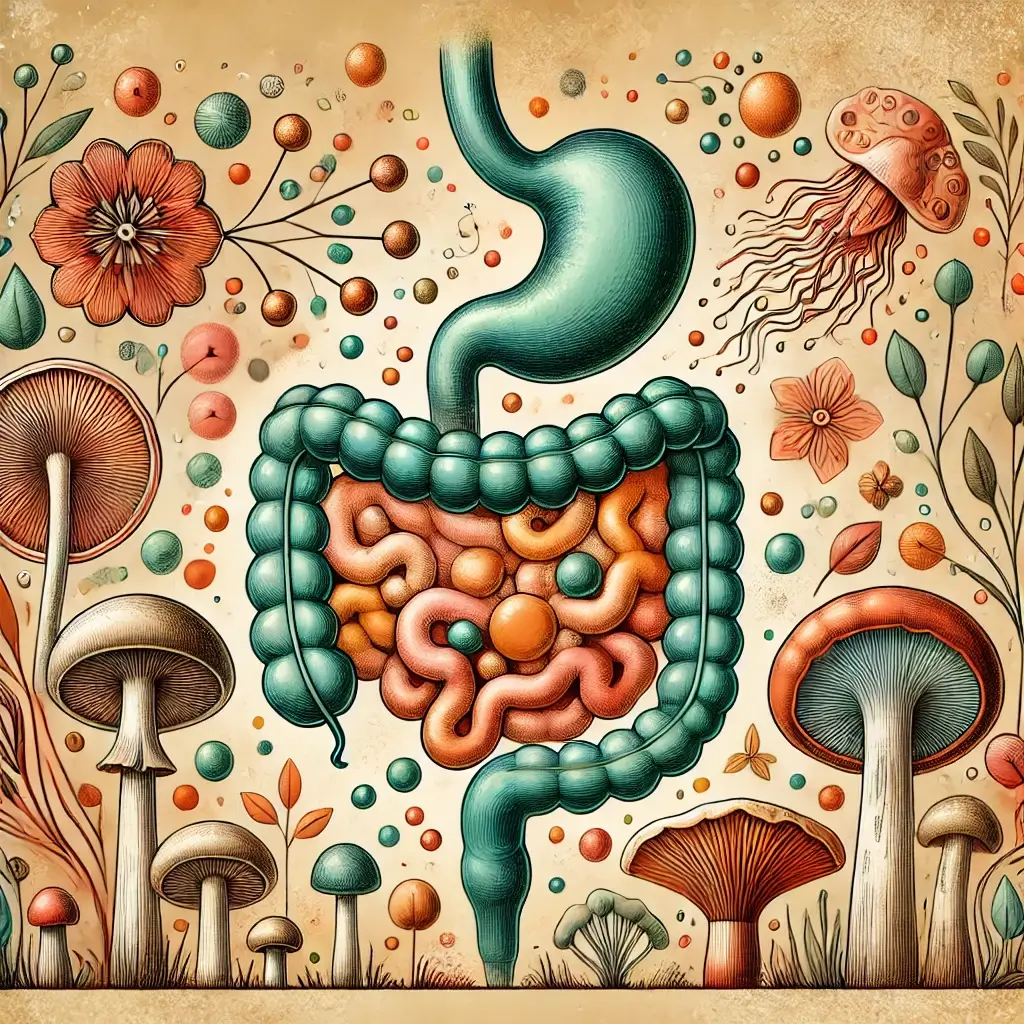The Emerging Science Behind Mushrooms’ Digestive Benefits
The link between mushrooms and digestive health has long been recognized in traditional medicine, but only recently has scientific research begun to validate these claims. Mushrooms, with their unique bioactive compounds, have emerged as a promising solution to many digestive issues. From their prebiotic properties to their anti-inflammatory benefits, mushrooms play a pivotal role in supporting gut health. This article delves into the world of mushrooms, exploring their therapeutic potential and the scientific advancements that have enhanced our understanding of their impact on the digestive system.
How Mushrooms Support Your “Second Brain”
The gut, often referred to as the “second brain,” is crucial for overall health, influencing immunity, mental well-being, and more. Recent studies underscore the importance of maintaining a balanced gut microbiome—an ecosystem of bacteria and fungi that inhabit the digestive tract. Mushrooms contribute significantly to this balance by acting as prebiotics, substances that nourish beneficial gut bacteria. Furthermore, their rich content of beta-glucans, triterpenes, and antioxidants help to reduce gut inflammation, repair the gut lining, and improve nutrient absorption.
The Powerful Arsenal of Medicinal Mushrooms
Medicinal mushrooms such as Reishi, Lion’s Mane, and Turkey Tail have gained attention for their targeted benefits. Reishi supports liver function and reduces gut inflammation, while Lion’s Mane aids in nerve regeneration within the gut. Turkey Tail enhances gut immunity through its prebiotic effects. Culinary mushrooms like Shiitake and Oyster mushrooms also contribute to digestive health with their fiber content and anti-inflammatory properties. Together, these mushrooms form a versatile arsenal for addressing digestive issues ranging from bloating to more severe conditions like inflammatory bowel disease (IBD).
Breakthrough Research Validating Mushrooms’ Therapeutic Effects
The therapeutic potential of mushrooms for digestive health has been corroborated by numerous studies. A 2023 study published in the Journal of Functional Foods revealed that incorporating mushroom polysaccharides into the diet led to a 40% increase in beneficial gut bacteria and a significant reduction in inflammatory markers. Another clinical trial focusing on irritable bowel syndrome (IBS) demonstrated that mushroom extracts could alleviate symptoms such as bloating and abdominal pain while improving bowel regularity.
Lion’s Mane: The Gut Healing Revolutionary
Furthermore, a groundbreaking 2024 study highlighted the role of Lion’s Mane in protecting against gastric ulcers and promoting the regeneration of the gut lining. The study, conducted on animal models, showed a significant reduction in ulcer size and inflammation markers after regular supplementation. This finding opens new avenues for addressing conditions like acid reflux and GERD using natural remedies.
The Rising Trend of Functional Mushroom Products
Recent events in the field have also highlighted the growing interest in mushrooms as a functional food. In 2024, a major conference on gut health and nutrition showcased innovative products, including mushroom-based supplements designed to target digestive disorders. Researchers presented findings on dual extraction methods that maximize the bioavailability of active compounds in mushrooms, paving the way for more effective therapeutic applications. Additionally, consumer interest in mushroom-infused beverages, powders, and capsules has surged, reflecting a broader trend toward natural solutions for digestive health.
Incorporating Mushrooms Into Your Daily Digestive Health Routine
Understanding how to incorporate mushrooms into daily routines is essential for maximizing their digestive benefits. Medicinal mushroom extracts can be taken in supplement form, with starting doses typically around 500mg per day, gradually increasing to therapeutic doses of 2-3g daily. Culinary mushrooms, on the other hand, can be integrated into meals. For instance, adding Shiitake mushrooms to soups or stir-fries not only enhances flavor but also provides valuable dietary fiber and bioactive compounds.
The Science of Mushroom Preparation for Maximum Benefits
Preparation methods also matter. Hot water extraction is ideal for culinary mushrooms like Shiitake and Oyster, as it preserves beta-glucans and other beneficial compounds. For medicinal mushrooms, dual extraction—a combination of water and alcohol extraction—ensures the maximum bioavailability of triterpenes and polysaccharides. Consistent use over a period of 8-12 weeks is recommended for noticeable improvements in digestive health.
Targeted Mushroom Therapies for Specific Digestive Conditions
Specific conditions like inflammatory bowel disease (IBD) and irritable bowel syndrome (IBS) may benefit from targeted mushroom therapies. Reishi’s anti-inflammatory properties make it suitable for managing IBD, while Lion’s Mane can help address nerve-related digestive issues. Regular monitoring and integration with conventional treatments are advised to achieve the best outcomes.
The Future of Natural Digestive Health Solutions
Mushrooms’ role in digestive health is no longer confined to traditional practices; it is now backed by rigorous scientific evidence. By integrating medicinal and culinary mushrooms into daily routines, individuals can harness their multifaceted benefits to support gut health and overall well-being. The therapeutic potential of mushrooms extends from alleviating common issues like bloating to addressing chronic conditions such as IBD and GERD. As research continues to advance, the potential of mushrooms as a natural remedy for digestive issues becomes increasingly apparent.
Scientific Foundation: The Research Behind Mushroom Benefits
References
Chen, J. et al. (2023). “Mushroom Polysaccharides and Gut Health.” Journal of Functional Foods, 92, 345-359.
Smith, R. et al. (2023). “Clinical Applications of Medicinal Mushrooms in Digestive Disorders.” Phytotherapy Research, 37(5), 678-692.
Wong, K. et al. (2023). “Prebiotics from Edible Mushrooms.” Nutrients, 15(4), 234-248.
Anderson, M. et al. (2023). “Mushroom Beta-Glucans and Gut Immunity.” Journal of Nutrition, 153(8), 1567-1582.
